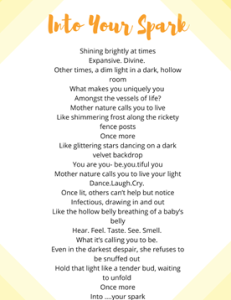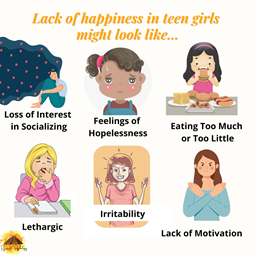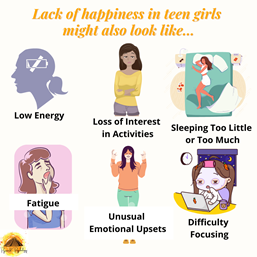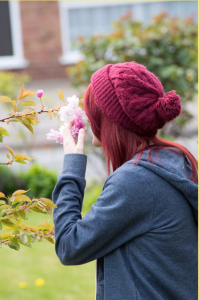Teen Happiness: Helping Your Daughter Find Her Spark

“Teen Happiness Helping Your Daughter Find Her Spark.” At the end of the day, you want your teen daughter to experience happiness in her life. Finding her spark is a way for her to create happiness. Her spark is what lights her up!
As a parent, there are ways you can encourage your daughter to discover her spark and increase its presence in her life.
First, let’s define what a spark is.
Teen Happiness – What Is a Spark?
I’ve come across this concept over the last few years. Finding your spark is about discovering what speaks to you, what really matters to you. Your teen is her own, unique being – there will be things that she is passionate about, that will be different from what others care about. You might notice they are in direct contrast to yours- ever tried talking politics or social issues with a lit up 15 year old?!

Photo by Canva
Picture your daughter’s spark as different strands of a rope – they are whole when they are intertwined together. One strand of your teen’s happiness spark is tangible, specific things – art, sports, favourite activities, physical objects, etc. Another strand includes qualities and values. Perhaps being kind to others is really important to your teen’s happiness, taking care of animals, or standing up for vulnerable populations. Many of the teens I work with are keenly aware and taking small and large actions to rally around LGBQT+ communities, our homeless populations, and others who don’t have access to basic resources.
The third strand includes what your teen daughter strongly believes in. This can words to live by, important lyrics, quotes or mottos that move her.
There are all sorts of components that are part of finding your daughter’s spark and increasing her level of happiness – being playful, or finding joy in making others smile, can be part of it too!
For me, creativity is an important part of my spark. Being a self-identified high achiever, I always want to be getting so much done; I get caught up in the daily grind to accomplish things. Even though I do find joy in these things – having my own business, doing well in my sports, etc. – not setting aside time for creativity is a disservice to myself. I feed my spark when I set aside time to get creative through art and writing, or when I dance and sing. I feel a great connection to my body and myself when I feed my spark. There is a hollowness when I’ve gone too long without getting creative.
When your daughter is living in alignment with her spark and behaving in ways that are connected to what’s important to her, that is when she is living her best life. Being in alignment with her spark will create more joy, passion, peace, and motivation in her life.

Photo by Canva
Hannah Alper shares a wonderful perspective in her TedTalk on How to Find Your Spark.
Teen Happiness – Encouraging Your Teen to Find Their Spark
I have compiled a list of ways you can encourage your daughter to find her spark – I challenge you to take a look at the list for yourself, too!
- Encourage her to try new things – Your teen daughter can get a feel for what she likes and doesn’t like by trying new things – school club, sports, animals, art, volunteering, etc. She can use the ‘rule in, rule out’ method – rule in what she does like, and rule out the things she doesn’t!
If your teen has a tendency to feel anxious, there may be a hesitancy to try new things. However, it’s still important to encourage your teen to try. You can encourage trying something new in smaller steps – a one time thing before committing to it long-term, or giving it a try with a friend, etc.
Photo by Canva
- Connect with your parent peers – This is for you. Be curious when you have the opportunity to chat with or meet other parents. Check in with what they are doing and trying with their teen daughters. What interesting things have they come across? What are they trying with their teens? This can give you connections and ideas for your own family.
Routines and rituals as a family – There are two types of routines, or rituals, you can create in your family that can help your teen daughter find her spark: routines that shed light on their uniqueness, and rituals that highlight gratitude and appreciation.
These routines can be very small, even something like changing how you ask about their day. Oftentimes we ask the regular questions – how was your day? What did you do? How was school? … Try asking a different question! It can be an opportunity to highlight something unique. A question I recently heard that you can ask instead: “how was it like to be in the lunchroom today?” This small shift can surprise them! Use routines like this to highlight what is unique about your teen’s responses, to hear more about what interests them, and highlight the qualities they possess.
Highlighting gratitude – the second type of ritual you can create in your family – puts into focus what your teen cares about (their spark). If your teen often says they appreciate their friends, family, etc., (for example), then connection and relationships could be part of their spark.

Photo by Canva
A gratitude circle at dinner time, where each family member shares something they are grateful for is one great ritual to try this with. You want to create a way for your teen daughter to appreciate something about themselves that they love, or have family members highlight something about everyone. The key is to be intentional about highlighting gratitude and noticing the things your daughter is grateful for (these are likely strands to her spark).
Ask about and encourage interests + passions – Ask your teen daughter what interests her and be curious to hear what she has to say. Encourage her to become more involved in the hobby’s, causes, activities, etc. that she gravitates towards.

Photo by Canva
If your teen daughter is passionate about doing her makeup, be curious about that! Ask her why she enjoys it. What techniques is she learning? Be interested in who she idolizes in the makeup industry.
It doesn’t have to be makeup – your daughter could be into sports, politics, etc. Anything, really! All you have to do, is listen to what she’s talking about a lot, and get curious about it.
I was out and about with my teen son the other day, a cold day, and there was someone outside asking for some money. When I pulled some change out of my wallet, I dropped back some and only gave this person some of what I had. My son asked why I didn’t give all of it to the person, and I explained that I may see others who need money throughout the week, so I give a little to each.
A little while later, my son said ‘we need to do better’. When I asked him what he meant, he said giving homeless people little bits of money here and there isn’t solving the problem of homelessness… My son sharing this with me tells me this is something that speaks to him, so I continued the conversation with him.
Your teen daughter may or may not have the solutions for what gives her a spark. But if she cares about it, that’s half the battle of happiness! So encourage her to talk about it! Express interest in the things she’s passionate about.

Photo by Canva
- Find a camp or program – Camps and similar programs are underrated. A parent and I were reminiscing about the camps they attended as a teen themselves – they dragged their feet, not wanting to go… But it always ended up being a great time, and created good memories.
Camps are fun, playful, inviting, and explorative. They can really help your teen daughter find her gifts, strengths and joys. I’ve even worked with a lot of teens who have gone to camps and have wanted to become facilitators or leaders and support other teens going through it.
Pick one or two of these things, and give it a try! Encouraging your daughter to find her spark will go a long way with her happiness.
Spark Tools with The Happiness Pill Program


If your teen daughter is living her life with the above symptoms – feeling hopeless, struggling with her diet, difficulties coping or sleeping, experiencing a lack of motivation, etc. – it isn’t easy (for her, or the rest of your family). This is a heavy way to live some of the best years of her life!
The Happiness Pill Program is designed to give you and your daughter long-term tools and skills to find and keep her spark, while holding anxiety and depression at bay.
When you book a free consultation with me today, you will immediately feel relief. A weight will lift off your shoulders; you don’t have to walk this path alone!
If you don’t get the extra support right away, it’s another day – week, month – of struggling blindly through this with your teen daughter.
You don’t want to keep struggling. Neither does she.
Happiness Pill
Chantal Côté (she/her) is a psychologist and teen life coach living in Calgary, Alberta. After over a decade in non-profit and community mental health, Chantal started Pyramid Psychology, a practice dedicated to supporting teens – a population she is constantly amazed by. Chantal is on a mission to help 100,000 teen girls (and their parents) build bulletproof mindsets so they can weather the ups and downs of life. As part of this goal, Chantal has had the privilege of speaking at various events – virtual and live – to support teens and parents.
Outside of this passion, Chantal is often in nature, writing poetry, playing ball hockey and hanging out with her loved ones.
Each week, Chantal writes a blog article in response to issues she hears from the parents and teens she connects with.
If you have something you’d like to read more on – email ideas and questions to info@pyramidpsychology.com or DM us via Instagram or Facebook.














 experiencing depression, in order to be there for her for the long haul, you’ll want to ensure you’re in a good place, filling your cup consistently, so you
experiencing depression, in order to be there for her for the long haul, you’ll want to ensure you’re in a good place, filling your cup consistently, so you  I have heard things like:
I have heard things like:





 Jessa is a counsellor that has recently completed her master of counselling degree through Athabasca University.
Jessa is a counsellor that has recently completed her master of counselling degree through Athabasca University.

 Oftentimes, teens wish they could simply take a pill and fix their depression, but this is often not a long-term solution.
Oftentimes, teens wish they could simply take a pill and fix their depression, but this is often not a long-term solution. 

 Chantal Côté (she/her) is a psychologist and teen life coach living in Calgary, Alberta. After over a decade in non-profit and community mental health, Chantal started
Chantal Côté (she/her) is a psychologist and teen life coach living in Calgary, Alberta. After over a decade in non-profit and community mental health, Chantal started 






























